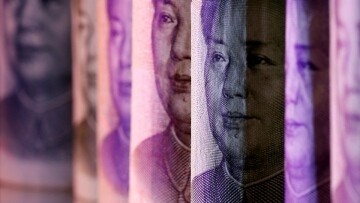
"Monitoring the updates from the relevant columns, the latest headlines represent only one phase in the overall trend of volatility driven by tariffs," said Philip Inn, currency and interest rate strategist at Citi for China.
The dollar weakened to a two-month low on Monday as concerns about a full-scale global trade war eased, which prompted some appreciation of the yuan. The offshore yuan also fell, trading at 7.2744 per dollar, down 0.1% on Asian markets.
Market participants remain cautious, as Beijing has yet to adopt immediate measures against the economic fallout from tariffs, while the U.S. has not announced any steps in its trade battle with potential inflationary pressures.
The yuan weakened against the U.S. dollar on Tuesday, when the greenback approached a two-month low as investors awaited further signals from China's and the U.S. policies after the introduction of new tariffs.
The spot rate for the yuan opened at 7.2650 per dollar and traded at 7.2737 at 03:10 GMT, down 87 points compared to the previous close.
"During the first half of former U.S. President Donald Trump's administration, the yuan lost more than 12% against the dollar from March 2018 to May 2020," analysts noted.
China's central bank set the midpoint at 7.1697 per dollar, which is 841 points stronger than previously expected by Reuters.
Separately, Chinese President Xi Jinping held a rare meeting with major leaders of the technology sector, including Alibaba founder Jack Ma, urging them to demonstrate their expertise and confidence in Beijing's economic model.
"Nonetheless, investors are now turning their attention to the protocols of the Federal Reserve's meetings from January, which should be published in mid-May, to assess the political optics on risks related to U.S. trade policy," analysts said.
Trade tensions between the two largest economies remain a key factor influencing the yuan. Analysts noted that while this meeting may boost market sentiment, it is unlikely to significantly impact currency or equity markets.
Currently, the dollar index (DXY), which tracks the dollar against a basket of six major currencies, rose by 0.187% to 106.92.













